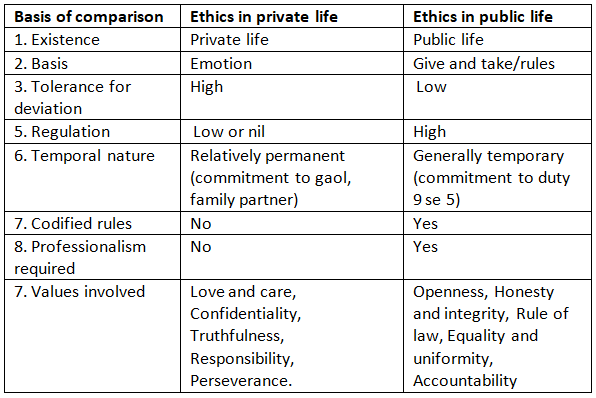UPSC Exam > UPSC Notes > UPSC Mains: Ethics, Integrity & Aptitude > Ethics in Public and Private Relationship
Ethics in Public and Private Relationship | UPSC Mains: Ethics, Integrity & Aptitude PDF Download
Ethics in Private and Public Relationship

Human beings are inherently social and engage in interactions that lead to the formation of relationships. As Gandhi stated, "To build a non-violent and truthful society, having good relationships is essential."
Four Principles of Public and Private Relationships
- Respect
- Understanding
- Acceptance
- Appreciation
Scope of Private Relations
- Private Relations: Private relations involve interactions with oneself, family members (spouse, parents, children, and other relatives), and friends.
- Factors Affecting Ethics in Dealing with Self:
- Having a positive or negative perception of oneself.
- The degree of consistency between one's words and actions.
- Factors Affecting Ethics in Marital Life:
- Understanding and appreciating the uniqueness of one’s spouse.
- Imposing one's self-will on the spouse.
- The level of freedom granted to the spouse.
- The degree of possessiveness towards the spouse.
- The level of doubt or mistrust regarding the spouse.
- Acceptance of the spouse's premarital relationships.
- Acceptance of the spouse’s aspirations and goals.
- A mindset of competition versus cooperation in the relationship.
- The willingness to correct the spouse when necessary.
- The extent of care provided to the spouse.
- The willingness to share the spouse’s burdens.
- Factors Affecting Ethics in Relations with Friends:
- The degree of trust placed in the friend.
- The level of support provided to the friend.
- The extent of emotional support given to the friend.
- The degree of respect and acceptance of the friend's values.
Features of Private/Personal Relations/Ethics/Life
- Private Relations: Private relations are informal, as there is no formal procedure to regulate them. These are personal, one-to-one relationships, typically based on emotional connections, where individual personalities are often expressed.
- Internal Control: Ethical behavior in private relations is primarily governed by internal control, rather than external regulation such as laws, rules, or regulations.
- Ethics Vary: The ethics in private relations can vary significantly from person to person, often influenced by factors like personal morality, emotional state, and individual interests.
- Duties in Private Relations: Duties in private relations are self-imposed, informal, and voluntary in nature.
- Impact on Individual Ethics: The ethics demonstrated in private relations contribute significantly to an individual’s overall ethics or morality.
- Basis of Public Ethics: The morality of private relations forms the foundation for ethical behavior in public relations.
- Values in Personal Relations: Personal relations involve core values such as love, care, respect, trust, responsibility, solidarity, peacefulness, good communication, security, and self-sacrifice.
Features of Public Relationship
- Public Relations: These relationships are predictable and formal, with clearly defined roles and expectations.
- Perception of the Individual: In public relations, individuals perceive themselves as part of the broader context, rather than as separate entities.
- Legal and Social Obligations: Public relations involve legal and social obligations, with duties that are often obligatory, externally imposed, formal, and sanctioned.
- Influence of Societal Norms: The ethics in public relations are influenced by the prevailing norms, values, and behaviors of the society in which they occur.
- Wider Impact: The impact of public relations is much broader, with the potential to affect society as a whole. Key ethical values in public relations include honesty, openness, integrity, and fairness.
Differences Between Private and Public Ethics

Reasons for Separation
- Different Domains: Private and public relations operate in distinct areas, each with its own set of principles and expectations.
- Potential Issues: Mixing the two can create problems. For example, private relations entering public relations may lead to nepotism and favoritism, while public relations influencing private life can undermine the sanctity, privacy, and intimacy of personal relationships.
- Preventing Conflict of Interest: To avoid conflicts of interest, it is important to maintain clear boundaries between private and public relations.
- Nature of Public Relations: Public relations are generally more complex and intense compared to private relations, involving a broader scope and often higher stakes.
Problems with Separation
- Not Separable: Distinguishing ethics in public and private relations is vague and difficult. These two realms cannot be clearly separated into distinct categories.
- Not Feasible: Private and public relations continuously interact and influence each other. Ethics in private relations helps humanize public relations and plays a crucial role in shaping an individual’s moral system.
- Not Manageable: Conflict between the ethics in private and public relations can create unrest, dissonance, and confusion in an individual’s mind.
- Not Desirable: A rigid separation between private and public ethics may be counterproductive. A person who is dishonest in private life cannot be truly honest in public life.
- Risk of Stagnation: Too much alignment between ethics in private and public relations can lead to stagnation, hindering the development of new ideas and societal change.
Effect of Public Relations on Private Relations
Positive:
- Inspiration: The compulsion to show respect for women in the workplace may encourage a man to treat his wife with the same respect at home.
- Value: Deceit by colleagues can often lead individuals to recognize the innocence and integrity of their family members and friends.
- Humane: The values associated with private life, such as love and care, can enhance the humanity and compassion shown in one's public life.
Negative:
- Spillover: The rigid discipline required in military or authoritative settings (like "Fauji Baap") can spill over into personal life, making family relationships overly strict or controlling.
- Time Management: Excessive involvement in public life can force individuals to reduce the time they spend with their private life, leading to imbalances between the two.
Effect of Private Life on Public Life
Positive:
- Improve Interpersonal Relations: A person who is honest in private relationships is likely to be honest in their public life as well, fostering trust and respect.
- Positive Mood: A healthy private life can contribute to a positive mindset, which, in turn, can enhance work efficiency and productivity in the office.
Negative:
- Stress: Tensions in family life can spill over into the workplace, leading to stress and negatively affecting professional performance.
- Prejudice: Personal biases or experiences from private life, such as following casteism, can influence behavior in the workplace, leading to discrimination or unfair treatment.
Common in private and public life
- Honesty
- Interpersonal skills
- Compassion
The document Ethics in Public and Private Relationship | UPSC Mains: Ethics, Integrity & Aptitude is a part of the UPSC Course UPSC Mains: Ethics, Integrity & Aptitude.
All you need of UPSC at this link: UPSC
|
78 videos|95 docs
|
FAQs on Ethics in Public and Private Relationship - UPSC Mains: Ethics, Integrity & Aptitude
| 1. What are the key differences between ethics in public and private relationships? |  |
Ans. The key differences between ethics in public and private relationships lie in the level of accountability and transparency required. Public relationships, especially in governance, demand a higher standard of ethical behavior due to the influence on society and public trust. Actions in public roles are subject to scrutiny and must align with laws and regulations. In contrast, private relationships, while still guided by ethical principles, often allow for more personal discretion and privacy, focusing on mutual respect and personal values.
| 2. How do ethical dilemmas in public service affect decision-making? |  |
Ans. Ethical dilemmas in public service can significantly affect decision-making by creating conflicts between personal values and professional responsibilities. Public servants often face situations where they must choose between what is legally permissible and what is ethically right. This can lead to stress, second-guessing, and potential inaction, ultimately impacting the effectiveness of governance and the public's perception of integrity in public office.
| 3. Why is integrity important in both public and private relationships? |  |
Ans. Integrity is crucial in both public and private relationships because it fosters trust, respect, and credibility. In public relationships, integrity ensures that leaders are held accountable and can effectively serve the community. In private relationships, integrity builds a foundation for honest communication and mutual respect, leading to stronger and more meaningful connections. Without integrity, both types of relationships may suffer from suspicion and conflict.
| 4. What role do cultural norms play in shaping ethics in public and private relationships? |  |
Ans. Cultural norms play a significant role in shaping ethics in both public and private relationships as they influence what is considered acceptable behavior within a society. Different cultures may have varying expectations regarding honesty, loyalty, and duty, which can affect how individuals approach ethical challenges. Understanding these cultural differences is essential for effective communication and ethical decision-making in diverse environments.
| 5. How can individuals improve their ethical decision-making in personal and professional contexts? |  |
Ans. Individuals can improve their ethical decision-making by developing self-awareness and understanding their values, seeking diverse perspectives, and considering the long-term implications of their choices. Engaging in open discussions about ethics, educating oneself on ethical frameworks, and reflecting on past decisions can also enhance one’s ability to navigate complex situations in both personal and professional contexts.
Related Searches


















